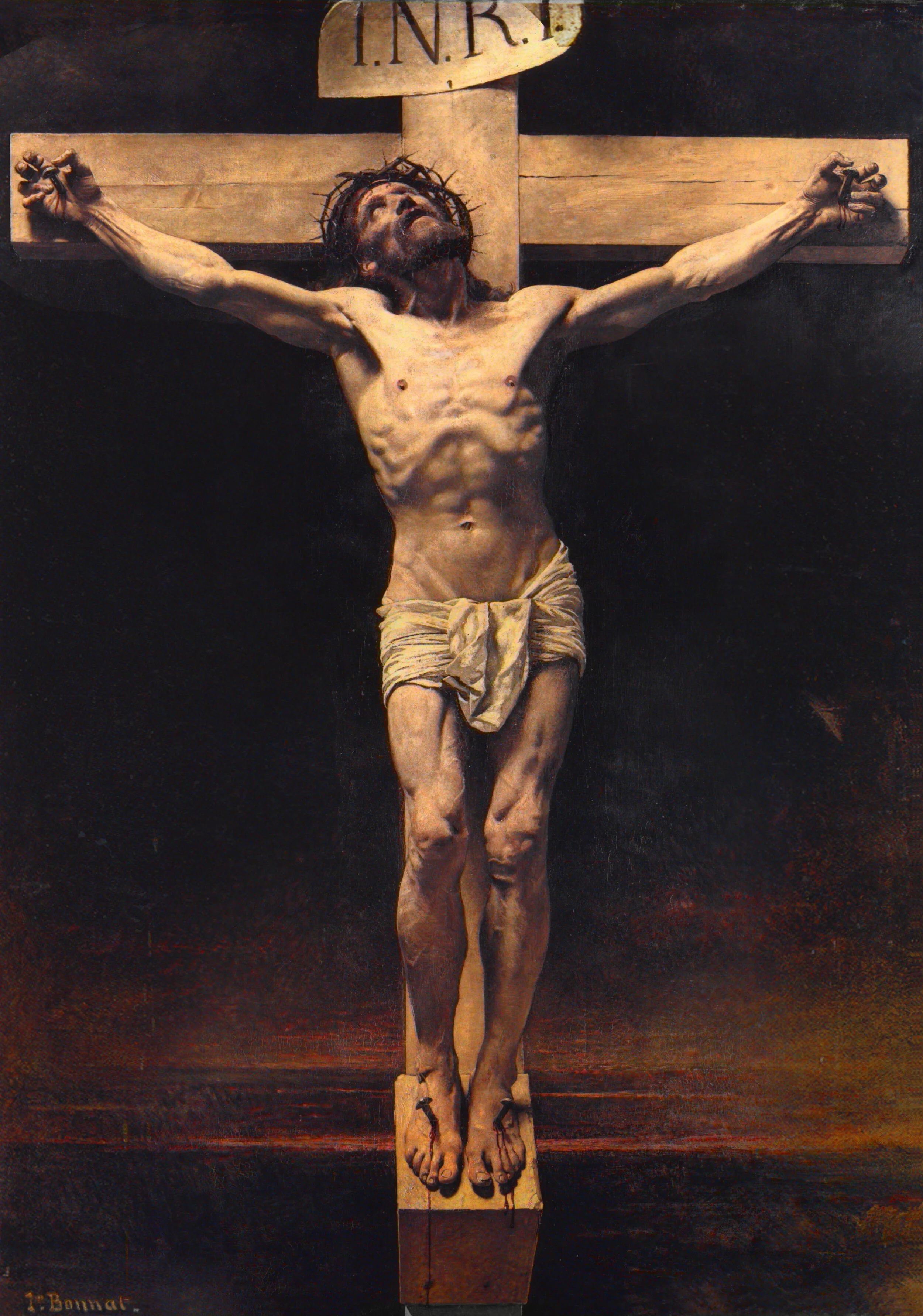Good Friday
by Father Seth Cain
They stare and gloat over me. (Ps. 22:17)
It’s Good Friday.
This depiction by Léon Bonnat of Calvary (1874) is one of the hardest for me to look at. No, it’s not the most graphic image of what Jesus endured. The use of red is sparing, more noticeable in the horizon than on his body. It doesn’t depict Jesus wincing from pain, crying out in agony, or slumping in exhaustion. (His tense hands are the sole indication of the pain. Look at his thumbs, especially).
Bonnat shows him suspended alone on a brooding sky, hanging in relief against the ominous, three-hour darkness. Wood and skin seem almost blended together in color and shade. Jesus has become the curse of the tree on which he is hung. He is alone in it, save the mockery.
Then all the disciples left him and fled. (Matthew 26:56)
And those who passed by derided him, wagging their heads and saying, “You who would destroy the temple and rebuild it in three days, save yourself! If you are the Son of God, come down from the cross.” So also the chief priests, with the scribes and elders, mocked him, saying, “He saved others; he cannot save himself. He is the King of Israel; let him come down now from the cross, and we will believe in him. 43 He trusts in God; let God deliver him now, if he desires him. For he said, ‘I am the Son of God.’” And the robbers who were crucified with him also reviled him in the same way. (27:39–44)
There were also many women there, looking on from a distance, who had followed Jesus from Galilee, ministering to him, among whom were Mary Magdalene and Mary the mother of James and Joseph and the mother of the sons of Zebedee. (v. 55, 56)
Scarcely a soul would dare risk coming near this accursed man. Those who pass by more closely will distance themselves with searing insults and taunts. The women who doted on him so closely in life now look on him from a distance as he dies.
Once upon a time, James and John asked to be on Jesus’ right and left when he comes into his glory. Jesus replied, “You do not know what you ask for.” Far from their imaginations of it, Jesus’ incomparable glory would be revealed as he is lifted up from the Earth in lonely agony on a cross to take away the sins of the world. Beside him instead are two denigrating thieves. In this case, and at least until one becomes desperate, common suffering does not even produce commonality or empathy.
Jesus, the only true human being, will hang devoid of all human connection, touched only once after being hammered down — just a sour sponge upon his lips.
After many years in life and ministry, I’m convinced loneliness is one of the most powerful motivators in human experience, if not the most. The emotion is at times so hollowing, it produces some of the most impulsive decisions, thoughtless actions and profound consequences I can think of. We make absurd statements and spin personal fables to gain even temporary attention. We strive to impress by contouring our bodies and crafting our images, hoping to linger in the admiration of those we admire (or anyone who will take notice). We remain silent in miserable relationships, even enduring abuse, to avoid the greater evil of being alone. We grow impatient and demanding with our spouses, expecting in the immediate an intimacy that can only come over years.
We are often so desperate to put another lonely body against ours, deferring the consequences or magnifying silver linings in tarnished relationships. We are haunted by the possibilities of an endless scroll of digital interactions and right-swipes. And sometimes we just anesthetize our desolation into a chemical oblivion. Down to the last ounce, the weight of our insecurity and the heft of its consequences hung on our loneliest Lord.
Now from the sixth hour there was darkness over all the land until the ninth hour. And about the ninth hour Jesus cried out with a loud voice, saying, “Eli, Eli, lema sabachthani?” that is, “My God, my God, why have you forsaken me?” (vv. 45, 46)
These words are not to be read as the Father’s absolute rejection of Jesus, though they do announce what our sin feels like on his weakening heart over against the righteousness of a holy Father. It is pure, isolating agony.
More clearly, Jesus’ cry is to the only One with him in his suffering, who also feels out of reach in this void to which our unrighteousness subjected him. What our suffering Savior feels goes straight to his Father as an invocation of the Psalmist who locates his own salvation in God alone. Jesus desperately seeks the only one who can (and will) save him — if he will come near.
Jesus cries out as God’s psalm for the world. For us.
And Jesus cried out again, and yielded up his Spirit. (v. 50)

